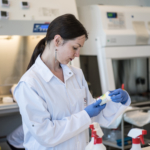The American College of Gastroenterology recommends against use of probiotics for primary or secondary prevention of C. difficile
By Prof. Daniel Merenstein MD, Georgetown University School of Medicine and Prof. Eamonn Quigley MD FRCP FACP MACG FRCPI, Houston Methodist Hospital and Weill Cornell Medical College
The American College of Gastroenterology (ACG) recently published ACG Clinical Guidelines: Prevention, Diagnosis, and Treatment of Clostridioides difficile Infections. This review considers probiotics for prevention of CDI. The ACG’s recommendations regarding probiotics and C. difficile infection (CDI) are:
- We recommend against probiotics for the prevention of CDI in patients being treated with antibiotics (primary prevention) (conditional recommendation, moderate quality of evidence).
- We recommend against probiotics for the prevention of CDI recurrence (secondary prevention) (strong recommendation, very low quality of evidence).
The ACG guidelines take a different approach to the evidence relating to probiotics than that of the American Gastroenterological Association (AGA) or the Cochrane Collaboration. The most recent Cochrane review on prevention of C. difficile-associated diarrhea (CDAD) concluded in brief, “moderate certainty evidence suggests that probiotics are effective for preventing CDAD”. In the AGA Clinical Practice Guidelines on the Role of Probiotics in the Management of Gastrointestinal Disorders, the recommendation was:
In adults and children on antibiotic treatment, we suggest the use of S. boulardii; or the 2-strain combination of L. acidophilus CL1285 and Lactobacillus casei LBC80R; or the 3-strain combination of L acidophilus, Lactobacillus delbrueckii subsp bulgaricus, and Bifidobacterium bifidum; or the 4-strain combination of L. acidophilus, L. delbrueckii subsp bulgaricus, B. bifidum, and Streptococcus salivarius subsp thermophilus over no or other probiotics for prevention of C difficile infection. (Conditional recommendation, low quality of evidence.)
In both the AGA and ACG guidelines the Grading of Recommendations Assessment, Development, and Evaluation (GRADE) system was used. How, then, did they come to such different conclusions and recommendations?
The ACG guideline stated, “a meta-analysis of 19 RCTs that concluded that probiotics were helpful at prevention of CDI in hospitalized patients if given close to start of antibiotics, with a 70% lower risk if probiotics were started within 2 days but falling to a 30% risk reduction if probiotics were started after 2 days of antibiotic therapy”. But then they did not take timing of probiotic administration into account as they assessed the evidence. Instead, they use the negative PLACIDE trial to override all other evidence for primary prevention. The PLACIDE trial was a well-done trial, but participants started their probiotic treatment 3- 7 days after antibiotics. Thus, it would seem that the ACG guideline’s conclusion could favor probiotics as long as they can be started within 2 days of the antibiotic and not recommend against probiotic use.
The ACG guideline objects to combining data on different probiotic strains in meta-analyses in order to provide evidence in favor of probiotics: “Evidence to support probiotics for this indication comes mainly from meta-analyses that pool data from small trials of different probiotic formulations and methodologies.” This is true, but the Cochrane review found thirty-nine studies (8,672 participants) that met their eligibility criteria and it is noteworthy that several different probiotics were found to be effective. The Cochrane number needed to treat (NNT) to prevent CDI is 42. However, if the ACG thought this was driven by too many negative trials, they could have qualified their recommendation. The Cochrane review found in subgroup analyses that probiotics are most effective (NNT=12) among trials with a CDI baseline risk >5%. But to conclude there is no benefit of probiotics for primary CDI is not supported by the evidence.
It is puzzling that ACG insists that the probiotic literature be pooled in a strain-specific manner, yet they support conclusions on fecal microbial transplant (FMT) even though FMT interventions are much more heterogeneous than probiotics in regard to composition and mode of administration. They recommend FMT for treatment of C. difficile based on only three double-blinded randomized clinical trials (here, here and here), only one of which was positive. The positive FMT study was conducted at two sites and compared donor stool (heterologous) versus patient’s own stool (autologous) administered by colonoscopy. Overall, 91% of patients in the FMT group achieved clinical cure compared with 63% in the control group. At site #1, the cure rate with donor FMT was 90.0% (CI, 51.8% to 98.7%) versus 42.9% with autologous FMT, whereas in site #2 the cure rate was essentially identical between the two groups. At site #2, donor FMT cure rate was 91.7% (CI, 57.2% to 98.9%) compared with 90.0% (CI, 51.8% to 98.7%) after autologous FMT. We mention this to question the consistency of evidence standards that the ACG guideline authors impose. They admonish pooled data from small trials of different probiotic formulations and methodologies yet ignore heterogeneity in FMT interventions. The data reviewed for probiotics was primarily from double-blinded randomized trials, while for FMT they rely on case series, uncontrolled studies or retrospective studies.
The authors go on to state, “… high quality evidence to support probiotics for most conditions is scarce.” How do they define “scarce” and “most conditions”? As mentioned, Cochrane found thirty-nine studies (8,672 participants) for prevention of CDAD. Under “summary of evidence”, the authors address issues such as size of the market, regulatory oversight, product cost and quality control problems with commercial products, all of which may reflect practical concerns with some probiotic products in the marketplace, but have nothing to do with available evidence. Furthermore, it is the only intervention where the financial value of the industry and cost of interventions is mentioned. Why are the size of the market or costs for FMT or drugs not just as relevant to this review? Cost is discussed throughout the recommendation but without performing or citing a formal cost analysis or cost-effectiveness analysis, even though there are approaches for doing so to inform evidence-based decision-making (here).
The authors indict probiotics for concerns about safety, citing not the thorough review sponsored by AHRQ and conducted by the RAND corporation that looked at 622 studies and found no statistically significant increased relative risk of the overall number of experienced adverse events (RR 1.00; 95% confidence interval [CI]: 0.93, 1.07, p=0.999), but by referring to a review article that cites case reports of blood infections and refers to one study with microbiota, not clinical, endpoints done in Israel on one commercial product. The data actually show that for well characterized, clinically tested probiotics with high levels of quality control the evidence for infectious complications in non-vulnerable populations is virtually nil. ACG does not mention that FMT was shut down due to safety concerns as soon as the pandemic started.
In summary, we are not convinced that the authors have justified their recommendation against the use of probiotics in relation to CDI prevention. They fail to clarify why the results of their GRADE evaluation of probiotic evidence for prevention of C. difficile resulted in totally different conclusions compared to the AGA document, which found evidence sufficient for conditional recommendation of four probiotic preparations. Further, the review of evidence for probiotics, whether in terms of efficacy or safety, should be addressed in a manner consistent with other interventions considered and editorializing on issues such as market size, profits and product cost, in the absence of an objective approach using appropriate instruments, should be avoided.















